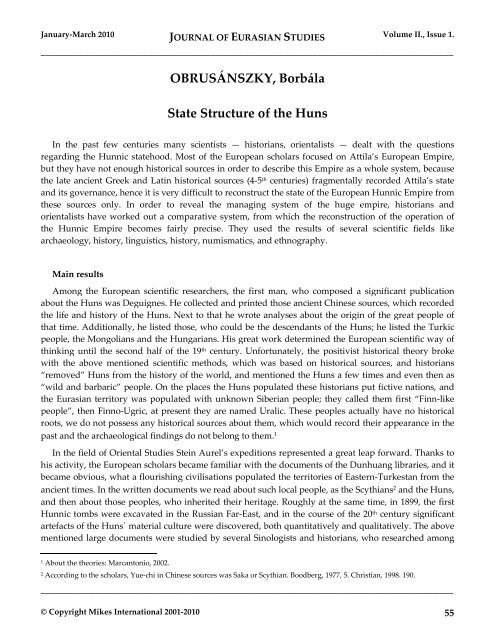EurasianStudies_0110..
EurasianStudies_0110..
EurasianStudies_0110..
You also want an ePaper? Increase the reach of your titles
YUMPU automatically turns print PDFs into web optimized ePapers that Google loves.
January-March 2010 JOURNAL OF EURASIAN STUDIES Volume II., Issue 1.<br />
_____________________________________________________________________________________<br />
OBRUSÁNSZKY, Borbála<br />
State Structure of the Huns<br />
In the past few centuries many scientists — historians, orientalists — dealt with the questions<br />
regarding the Hunnic statehood. Most of the European scholars focused on Attila’s European Empire,<br />
but they have not enough historical sources in order to describe this Empire as a whole system, because<br />
the late ancient Greek and Latin historical sources (4-5 th centuries) fragmentally recorded Attila’s state<br />
and its governance, hence it is very difficult to reconstruct the state of the European Hunnic Empire from<br />
these sources only. In order to reveal the managing system of the huge empire, historians and<br />
orientalists have worked out a comparative system, from which the reconstruction of the operation of<br />
the Hunnic Empire becomes fairly precise. They used the results of several scientific fields like<br />
archaeology, history, linguistics, history, numismatics, and ethnography.<br />
Main results<br />
Among the European scientific researchers, the first man, who composed a significant publication<br />
about the Huns was Deguignes. He collected and printed those ancient Chinese sources, which recorded<br />
the life and history of the Huns. Next to that he wrote analyses about the origin of the great people of<br />
that time. Additionally, he listed those, who could be the descendants of the Huns; he listed the Turkic<br />
people, the Mongolians and the Hungarians. His great work determined the European scientific way of<br />
thinking until the second half of the 19 th century. Unfortunately, the positivist historical theory broke<br />
with the above mentioned scientific methods, which was based on historical sources, and historians<br />
“removed” Huns from the history of the world, and mentioned the Huns a few times and even then as<br />
“wild and barbaric” people. On the places the Huns populated these historians put fictive nations, and<br />
the Eurasian territory was populated with unknown Siberian people; they called them first “Finn-like<br />
people”, then Finno-Ugric, at present they are named Uralic. These peoples actually have no historical<br />
roots, we do not possess any historical sources about them, which would record their appearance in the<br />
past and the archaeological findings do not belong to them. 1<br />
In the field of Oriental Studies Stein Aurel’s expeditions represented a great leap forward. Thanks to<br />
his activity, the European scholars became familiar with the documents of the Dunhuang libraries, and it<br />
became obvious, what a flourishing civilisations populated the territories of Eastern-Turkestan from the<br />
ancient times. In the written documents we read about such local people, as the Scythians 2 and the Huns,<br />
and then about those peoples, who inherited their heritage. Roughly at the same time, in 1899, the first<br />
Hunnic tombs were excavated in the Russian Far-East, and in the course of the 20 th century significant<br />
artefacts of the Huns´ material culture were discovered, both quantitatively and qualitatively. The above<br />
mentioned large documents were studied by several Sinologists and historians, who researched among<br />
1 About the theories: Marcantonio, 2002.<br />
2 According to the scholars, Yue-chi in Chinese sources was Saka or Scythian. Boodberg, 1977, 5. Christian, 1998. 190.<br />
_____________________________________________________________________________________<br />
© Copyright Mikes International 2001-2010 55

















